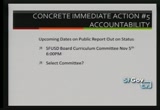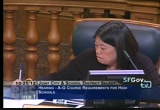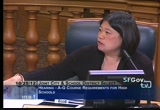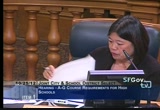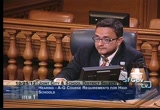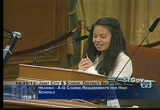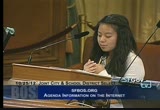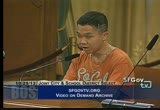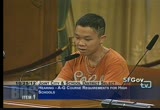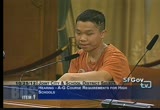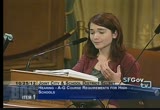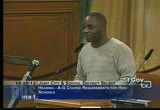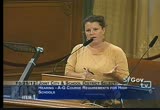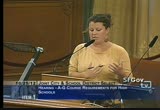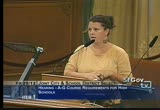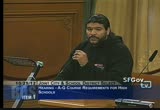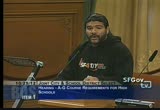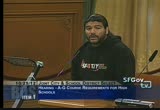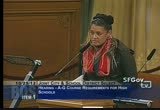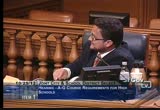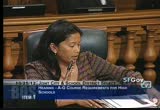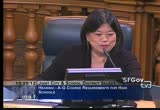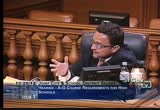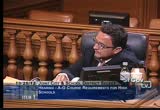tv [untitled] November 1, 2012 5:00pm-5:30pm PDT
5:00 pm
our school board curriculum committee on november 5th and we're happy to come back to select committee or any other venues that you feel is appropriate and helpful to continue a regular dialogue and status update on that. so i will go for questions right now. >> commissioner fewer. >> thank you, janet. i have a question. are these online options, other classes or uc-approved? >> yes. it's a combination. so the only online provider that is crucially uc-approved is cyberhigh. and it's the one that is -- >> the most boring. >> the driest or most boring. there are other ones that are in the process of being uc-approved and can count for credits with principal authorization. we went through a vetting process and we have two online
5:01 pm
vendors who students find much more engaging and they have second language options, videos. you can listen. it's much more interactive way of learning. so we would like to expand those so that schools have more of an opportunity to use those. >> i know that it was a pilot program at some schools. do we have any success rates on that? >> i don't have the exact data. it's something we could certainly bring back. we used oddsey before. we had a lot of success with that. and then aveneta has been used at john oconnell and that was
5:02 pm
the one they selected. >> if possible, i presented before the youth commission and the youth commission asked us specifically for the success rates of the targeted recovery options. so if we could get that information. how successful is summer school? passing grades and that kind of thing. how successful is night school? how successful are the online options for students? let's see, what other things are we doing? i think those are the three options that we're looking at, is that correct? >> correct. >> so the youth commission specifically as a commissioner specifically asked for the success rates of those programs. and then i just want to say that they have been trained on what
5:03 pm
the recovery options will be? at their school site or away from their school in spite because really i haven't seen what the current recovery options will be at each school site or in the community. so i'm wondering if the counselors know and if they have been trained on it? otherwise, how can they direct the students to actually participate in them if they don't themselves know. i think also that with some of these students this may just be what takes to get them back on-track, by saying that you need to take this and this and this, but for other students it's going to be much more hand-holding and time-intensive and therefore more resource-intensive. so i would like to see a plan for students that are much more labor-intensive, which may take a little bit more hand-holding.
5:04 pm
and then sadly, i would like to see realistic goal of how many we can actually reach and be successful reaching? so i would like to set a goal for ourselves and then see how close we can get to that benchmark. thank you. >> thank you, commissioner. thank you, dr. schultz for the presentation. colleagues i know we have a number of members of audience who are here to provide public comment on this important item. i don't know if we have any comments, but unless there is objection, why don't we turn to public comment. normally i give three minutes to each speaker, but i want to make sure we don't lose our quorum. so if we could limit it to 2 minutes and if you could please come forward. let me read some of the cards. if any member of the public would like to speak, please come up. [ reading speakers' names ]
5:05 pm
please come up and go to the mic. don't be shy. you only have the entire city watching. [ laughter ] only. >> good afternoon honorable supervisors and board of ethics commissioners. i'm kristin winn, district 6 youth commissioner and high school student. first and foremost i would like to thank the board of supervisors and board of education for holding this meeting. it's important for high school students and it's important for youth to graduate from high school with resources and for qualifications for going to
5:06 pm
usc or ucs. also recognizing there are many youth out there who don't know where or how to find their way to resources even if they wanted to. and with this new a-g requirement, students are able to graduate with a guarantee that they will qualify for csus and ucs, but it's very alarming to see there are so many disputes who are off-track on graduating. and i would want my peers to have the support that they need. so if there were more resources, like how these resources were able to help me. we need to make sure that all students have the opportunity, resources and support that they need to graduate. and 2014 may seem far away, but
5:07 pm
it's these next two years and the support we may or may not get that will determine where our future will be. thank you for your time. >> thank you very much and we want to thank the members of youth commissioner for their tremendous service to the city. it's always great to see them here at chambers. we also have other speakers. chelsea boyler. >> good afternoon, supervisors. and everyone. my name is brian. i am 18. i am from mig mission mission high school and from the neighborhood of the tenderloin. i am an english-language learner. i want all of the students to have an opportunity like me to have an opportunity in high
5:08 pm
school and getting to ucla or uc santa cruz. to achieve my goals i need to study really hard in my english. i put all my effort in two years to get my english to speak in public and talk to all the people. now i can talk in front of everyone -- so the problem with my school is that we have seen a lot of kids that are playing around and they are not really focusing on the studying. so they are off-track. and that means that they cannot graduate from high school and cannot go to college. so i
5:09 pm
hope that they need to really focus on studying so they can graduate from high school. the only thing is that we need more services in the school like tutors and programs that the youth had more credit recovery. thank you all. >> thank you. i just wanted to say that i was very impressed with the presentation and being an immigrant myself, i can till that there is no doubt in my mind you are going to go very far. thank you. keep it up. next speaker. >> hello honorable supervisors and board of education commissioners. my name is shackleford and the chairperson of the youth commission. we're really concerned about
5:10 pm
the issue and we voted to support supervisor kim's legislation to make sure that the youth currently not on track to graduate are given credit opportunities. i want to commend supervisor kim and the other co-sponsors and thank commissioner fewer and thank commissioner mendoza for their work on this issue and their presentation. thank you commissioner fewer for following up on the success rates of the credit recovery program. it's incredibly important that as requirements are increased that the district can provide resources to support them. their requirements are important to getting san francisco's young people to college, but we can't set them up to fail. i'm glad that the counselors will be having the meetings and i'm a little concerned that they won't do it by november 19th, seeing that we're in the midst of college application season.
5:11 pm
but hopefully, that will happen before the next school year. at the moment our joint education committee, which works with the student advisory council is working on a resolution addressing the achievement gap in san francisco at-large because we feel like this isn't just an issue of this one-time increase in requirements. if you look at the numbers, there are incredible disparities between communities and we think there needs to be long-term solutions to address the issues in our city's educational system. thank you so much for your attention. >> thank you very much, madame president. next speaker. >> good afternoon, supervisors. my name is antonio. i am a community organizer and activist and i support causes that i feel worthy and i
5:12 pm
believe that supporting kids is a very honorable thing to do. i asked myself and some other folks why black and brown students are behind in credits? this is the main question, why are they behind in credits? if we don't know the reasons and what causes it, we cannot easily find the solution. i come from a family of middle-class family and my mom she was a teacher junior high for about 37 years. i had an opportunity to learn more than the average student because i had the proper materials, proper assistance. so the kids coming from poor familis if they don't have the extra support, they won't succeed. that is why they are behind. there are more reasons. i remember of the last debate,
5:13 pm
the madame there was great and fired up. i was really impressed and i think we should have more people like you on school boards. people who are really inspired and care about the kids. more academic opportunities and tutors and more oversight to recover this problem. because some kids they learn. based on cultural experience. for me coming to the united states, i did not know how to speak english. i only knew how to spate speak portuguese. thank you. >> thank you very much, next speaker. >> hello my name is [tkha-els/] from coleman advocates for children and
5:14 pm
youth and thanks for the presentation and your attention. [speaker not understood] she went to her high school counselor and the counselor said -- she said why didn't you give me these credits? and she said i didn't know you wanted to go to college. i just thought you wanted to graduate high school. the reason why we pushed for this policy to go into place and the reason why i think the board of education unanimously voted for it and their original intention of this policy is that we graduate students college and career-ready not just to graduate high school and not just for low-wage job
5:15 pm
so they can make a choice for themselves as opposed to someone else making the choice for them; right? i think in saying that means that we need to look at c or better as the measurement of our success in preparing students and not just looking at a d; right? in the charts that were presented, it says that 26% of african-american students are on-track with a d or better. that means that 74% are not. when we're looking eight c or better, it's actually 9% 89% of african-american. i do want to echo what sandy fewer talked about that we believe that we need to be talking about this as four levels of off-track; right? >> my boyler let me ask you a
5:16 pm
question to conclude your thought. >> thank you, so we just believe there needs to be intervention at every single level to make sure those students are back on-track. the last thing i want to say is that credit recovery and academic support to make sure students are successful is key. i know that the district and at the state level is dealing with huge amounts of budget crisis, but this has to be a priority. we're facing a crisis and honestly it will be an embarrassment if we don't address these numbers now. thank you. >> thank you very much. please come forward. >> good afternoon supervisors, commissioners. my name is jose luis mujila and i work with transitional youth and we advocate on behalf of 16-24-years-old in the city. i was born and raised here. i went it all public schools and graduated from balboa high
5:17 pm
school. but unfortunately, i graduated with very few people that i started out in 9th grade with, as i think a lot of our young folks do. i actually just barely graduated and believe i was not ready for college at the time. i think it's the case for a lot of young people. so i just would like to speak to first of all how excited i am and how i just want it to be known that we do action research and street interviews and focus groups with the young people. young people actually want high standards, which is kind of surprising. while some people may not always think that, but they want to be pushed and challenged. so it's exciting to know that we're raising the bar so that young people can graduate with those requirements to go to a uc or four-year school. but to the points that have been made before, i want to just echo the fact that we
5:18 pm
really, really cannot just raise the bar without also raising the amount of support and comprehensive supports really to support our young people. also i would just like to say, as much as we need the credit recovery, i hope we're able to prioritize and the young people that are the most off-track, who are in the most need, especially i would like to highlight some of our young people that experience high trauma and violence in the community and the fact that you can't expect young people that experience those things, especially with what has been going on right now community, to succeed in school without real support to address the trauma and these type of issues. >> i will allow you to finish your thought. >> thank you. just the last point. , as much as this is exciting, i hope that also i want to bring to the attention the young people that are still not being addressed through this
5:19 pm
work. which is the folks already pushed out, young adults in their 20s that need to be reengaged in school. we have a real need for a comprehensive reengagement center in san francisco. there are a whole bunch of folks that have been pushed out that need to be re-engaged in school to also succeed and be ready for a job. thank you. >> thank you very much. next speaker. >> good afternoon. my name is catherine and i'm with the college connect program with mission graduates. and i am here to speak off and on behalf of the importance of credit recovery. in our program in particular we
5:20 pm
school to [pha-eubgs/] sure that the counselors have support that they need to help the students that aren't passing these classes. there are cyberhigh and afterschool programs to help them succeed. we have students that are able to succeed through our program, but there are so many more that have to go elsewhere. i just wanted to have this publication comment to say that i'm really in support of getting more supports to the
5:21 pm
counselors in these schools. >> thank you very much. is there any other member of the public? >> hello my name is michelle kong, a junior at gal galileo high school and intern at the san francisco youth commissioner and i would like to say it's very hard for some of us high school students to complete the a-g courses. as a chinese immersion program i would have to take cyberhigh or night school orcy college to complete the two courses or else i cannot graduate. that is extra pressure for high school students because we try to get the most out of our high school education by taking ap classes. and by taking these supplemental courses, we have to take extra time and extra concentration to these classes.
5:22 pm
and that adds onto our stress. i don't feel that benefits our health very much. i really hope that you guys will continue to support these students with funding and different community-based organizations and help them out. >> if i may say, i am proud to say that mish michelle has been an intern in our office and has done a tremendous job and i'm very proud of her. commissioner fewer, did you have a question? >> i also wanted to mention that michelle is quite fabulous, but brings up a good point. michelle, would you like into those two requirements at galileo high school and see how they can fit it sequentially into their programs? thank you michelle. >> thank you. is there any member of the
5:23 pm
public who has not spoken and would like to speak on this item? seeing none, public comment is closed and again, we want to thank all of our community members who have come out. i especially want to thank the young people who have come out to testify, becaused it a of the day, we're here because of them. so colleagues, commissioner mendoza? >> thank you. thank you so much and i appreciate the continued conversations that we have around a-g. i have to say when the board voted on this unanimously, it really made so much sense for all of us. because we were graduating our students without having options for them in terms of going on to college. and i think for me, this is more than just making sure that the kids get their a-g, but it's also spending time training our counselors, and our teachers, to ensure that they get the support that they need in order to really think
5:24 pm
about all of this. i know that we have had some fits and starts in implementing a-g, it's not an easy process to go through. we had to peel away some classs that kids really liked and had to get some class approved to be a-g. so i want to thank the efforts of school district as they have gone down this path. we're one of very few of handful of school districts that actually require a-g as a graduation requirement and i think it speaks to the board's desire to do better for all of our kids. and we're very committed to ensuring that that happens. i do feel the same frustration, i think that we all do, that this isn't fall into place the way that it should have and the way that we want to. so i
5:25 pm
really want to appreciate the efforts that commissioner fewer has been putting forward, because she really holds everyone's feet to the fire and she is a reminder that we made a commitment to our kids and families and we're going to stick to it and do everything possible for that. and along with the summer programming, we have also talked about doing intervention in the meanwhile and not having summer school just be the default place that our kid goes at the end of the year, but really thinking about how do we get to them during the year? so that they don't have to go to summer school. >> thank you. >> thank you commissioner. commissioner fewer. >> thank you, supervisor. thank you commissioner mendoza. in case folks are listening and don't understand what an a-g sequence it is, it's the minimum requirement to be
5:26 pm
accepted to an csu or uc. it doesn't mean that you will be accepted, but it's the minimum requirement. one, it gives all kids access to those classes which we were not doing before and another thing if we do it really well, it gives them access to greater opportunities in the 21st century. so we have done the first part giving access to the classes. the second part has been very difficult under the budget constraints also. i want to emphasize it's not really lack of will from the school district, but lack of funding resources. let's just face it, d or better is a lie to our students. if we say that we are graduating a-g because you have greater opportunity for college entrance, but also to take an exam to perhaps get into a union job. it is really a lie to our
5:27 pm
students a d or better. if we have students that graduate only d's or better that is not giving them more opportunity. that is actually not coming through with our promise to these students. so just to let folks knowing that we're doing d or better now, but why we need the numbers for c or better is because we need know what we need to do to get those students ready to graduate c or better. it is our intention, i think, to deliver on our promise to our students, that will give them great opportunity and that greater opportunity is a c or better. i especially want to thank the youth commissioner for coming out in support of this funding for credit recovery for the students and actually asking really, really thoughtful questions. i appreciate their support and also their greater interest in this. because they realize and know
5:28 pm
students who are struggling to meet these high requirements. thank you. >> thank you, commissioner. one thing that i would like to discuss at some point and i don't know that today is necessarily the day to do this, but as we're looking at the objective of giving every student the opportunity to go to college by allowing them to meet these requirements. the focus isn't necessarily on what the school district is doing, but i would like to say more and have more of a discussion about what else the city can do to help the school district reach that objective? and i know that there is additional supportal funding that supervisor kim has introduced. and a number of us are supportive of that. but i would like to have an even greater discussion that
5:29 pm
goes beyond the specific amount of money. but what else is it that we can do to collectively reach that objective? because to the extent that resources are a big problem here, is there -- are there additional things that the city can do with the resources that we do have to help in this effort? and to me, that discussion will also involve a discussion about what different city agencies, what role they can play in this effort? you know, what is it -- what kind of support system is needed to help a student achieve academic success? and academic success doesn't just happen in the classroom. it's something that requires an entire community
99 Views
IN COLLECTIONS
SFGTV: San Francisco Government Television Television Archive
Television Archive  Television Archive News Search Service
Television Archive News Search Service 
Uploaded by TV Archive on

 Live Music Archive
Live Music Archive Librivox Free Audio
Librivox Free Audio Metropolitan Museum
Metropolitan Museum Cleveland Museum of Art
Cleveland Museum of Art Internet Arcade
Internet Arcade Console Living Room
Console Living Room Books to Borrow
Books to Borrow Open Library
Open Library TV News
TV News Understanding 9/11
Understanding 9/11